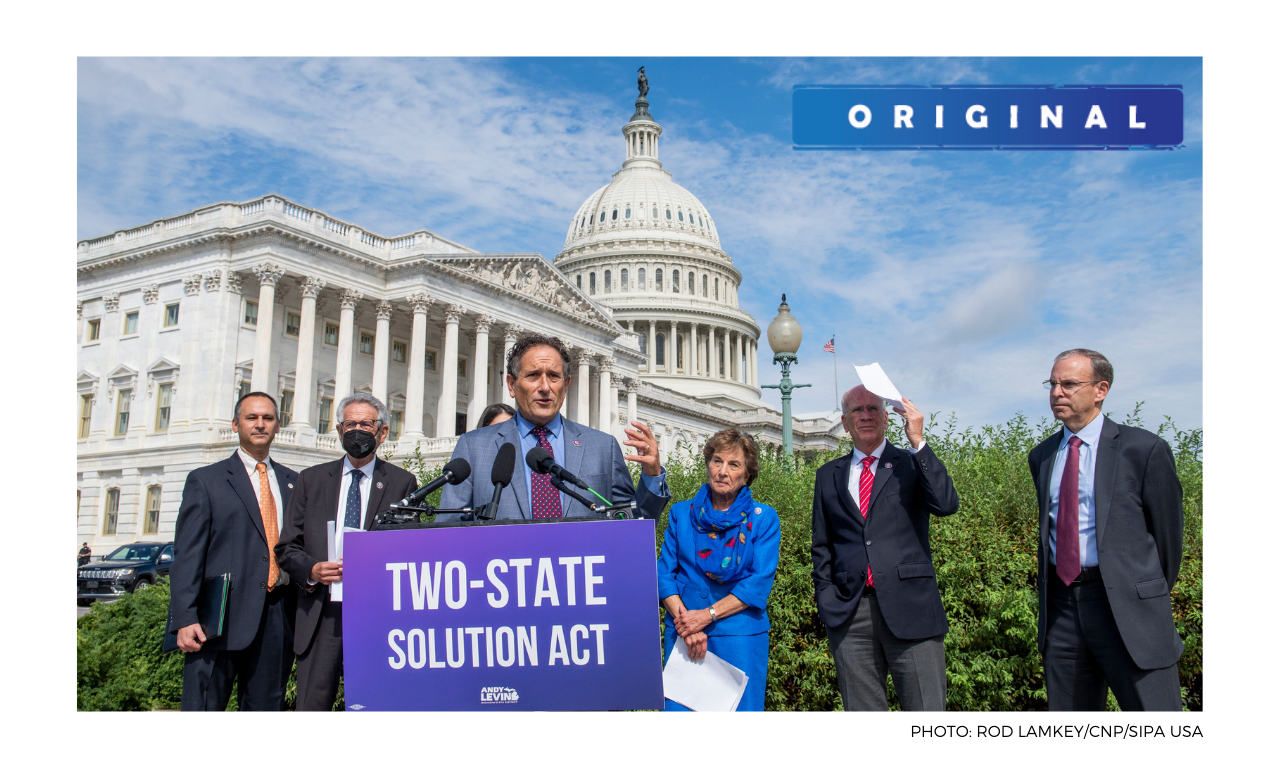Published: 15 October 2021
Last updated: 4 March 2024
DAN COLEMAN: US Democrat Andy Levin tackles some thorny questions with the bill he has drafted to reinvigorate the US commitment to a two-state solution
“AS A JEWISH AMERICAN, I was raised with a strong attachment to Israel.” With these words, Democrat Congressman Andy Levin last month introduced his Two-State Solution Act, a bill aimed at putting the two-state solution at the heart of US policy toward Israel and Palestine.
For Levin, 61, the third member of Congress from his Detroit Jewish family, his feelings about Middle East peace grow out of personal experience. He describes how, in his twenties, he organised an interfaith trip to Israel and Palestine. The experience brought the “urgency, pain and injustice of the status quo into stark relief.” Returning years later as a member of Congress, he found that “the injustices on the ground and obstacles to peace had only grown worse”.
As a result, Levin now aspires to reinvigorate the United States’ commitment to “a two-state solution that secures Israel’s future as a democratic state and a national home for the Jewish people, a viable, democratic Palestinian state, an end to Israel’s occupation of the Palestinian territories, and peaceful relations between the two states”.
Levin laments “in recent years, saying one supports a two-state solution has become like authoring ‘thoughts and prayers’ in the wake of a mass shooting. People say they support the two states, but words are not connected to any deeds.” The Two-State Solution Act is “designed to reverse that trend.”
The bill (HR 5344) currently has 29 co-sponsors, all Democrats, seven of them Jewish. Among its findings are an array of precedents, going back to the Eisenhower Administration, that placed conditions on US aid, supported two states, and decried the settlements.
In the 1980s, President Reagan declared that “further settlement activity is in no way necessary for the security of Israel and only diminishes the confidence of the Arabs that a final outcome can be freely and fairly negotiated”.
In the 1980s, President Reagan declared that “further settlement activity is in no way necessary for the security of Israel.
Loan guarantees signed into law by George W. Bush in 2003 stipulated that they were “only to support activities in the geographic areas which were subject to the administration of the Government of Israel before June 5, 1967”.
In this context, the Trump Administration’s collaboration with Israeli unilateralism was a historic outlier. President Biden has already moved the US back towards the earlier course, telling the United Nations General Assembly last month, “I continue to believe that a two-state solution is the best way to ensure Israel — Israel’s future as a Jewish, democratic state living in peace alongside a viable, sovereign, and democratic Palestinian state”.
HR 5344 reasserts the demarcation between Israel and the Palestinian territories, clarifying that, from a US perspective, East Jerusalem, the West Bank and Gaza are occupied territory and that goods imported to the US from those areas must be marked “made in West Bank” or “made in Gaza”.
This is a rejection of Trump Administration policy that allowed products of the settlements to be labelled “made in Israel”.
Levin’s bill affirms long-standing US conditions on foreign aid that forbid its use for activities that violate human rights or international law, that, to achieve peace, Israel should be no different from other nations in this regard.
Levin is tough on current Palestinian leadership, rejecting both the Palestinian Authority, for violations of human rights and civil liberties, and Hamas, for terrorism.
Levin is tough on current Palestinian leadership, rejecting both the Palestinian Authority, for violations of human rights and civil liberties, and Hamas, for terrorism. The bill calls for “a Palestinian government that respects civil and human rights and enjoys legitimacy among the Palestinian people, both necessary in its own right and important for productive negotiations on a two-state solution”.
To that end, it allocates funding for strengthening Palestinian civil society and calls for implementation of the Nita M. Lowey Middle East Partnership for Peace Act of 2020, which authorised $250 million over five years to fund Palestinian economic development and people-to-people initiatives that connect Israelis and Palestinians.
For Levin, the bill is not just an expression of his commitment to Israel but an articulation of his Jewish faith as well.
He told the Jewish Telegraph Agency: “The mitzvah that is repeated more than any other in the Torah, 36 times, is to protect the stranger. I submit that if you’re really a person of faith, you have to think, well, the Torah just isn’t talking about any old stranger, really.
“We probably need to think of, who [are] the hardest strangers, who is the difficult stranger to love as ourselves and to come to break bread with and to support and love. I think the question answers itself for the Jewish people: The hardest stranger is the Palestinian people.”
Despite Levin’s citing precedents from an array of Republican presidents, support so far has come from the Left. Jeremy Ben-Ami, president of the liberal advocacy group J Street, stood beside Levin at the bill’s introduction. He told Politico “this is the single-most comprehensive piece of legislation on the two-state solution that I’ve seen since I’ve been working on this issue”.
Who is the difficult stranger to love as ourselves? The question answers itself for the Jewish people: The the Palestinian people.
Amos Schocken, publisher of Haaretz, tweeted: “This legislation, if enacted, will make Israel a democracy again.”
But not everyone is happy with Levin’s bill. Beth Miller is government affairs manager at JVP Action, a political advocacy group linked to Jewish Voice for Peace. She told Middle East Eye: "the Two-State Solution Act ignores the core problem: the Israeli government imposes a system of separate-and-unequal rule over all Palestinians and Israelis, subjecting Palestinians to systemic human rights abuses.
"While there are pieces of the bill that are positive - including aid restrictions on annexation of Palestinian land, settlement construction, demolitions of Palestinian homes, and forced displacement of Palestinians - it falls short of what is needed."
This glass-half-empty perspective is shared by Sana Siddiq, policy manager at the US Campaign for Palestinian Rights, who said "the Two-State Solution Act is not a progressive bill and fails to advance a rights and justice based foreign policy".
Levin has tried to strike a balanced approach, one that would put the US firmly in support of efforts to build a foundation for peace. Still, in today’s political climate it is hard to know whether HR 5344 will even make it out of committee. For the most ardent supporters of Palestine, it is not enough. For the right-wing pro-Israel constituency, anything is too much.
But even if Levin’s bill doesn’t pass in its entirety, supporters are confident it will have an impact. “This is all part of a process of changing the conversation around US policy in this conflict,” Ben-Ami told Politico. “It’s an important shove of the conversation forward.”
many people would have you believe that you can’t care about both Israelis and Palestinians at the same time. That you have to make a choice. They’re wrong.
Hadar Susskind, President of Americans for Peace Now, who also joined Levin for the bill’s introduction, said, “The moment for a transformative and lasting Israeli-Palestinian peace deal may not be here now. But US policy is clear and unequivocal: in favour of a two-state solution.”
At the heart of the matter, for Rep. Andy Levin, lies his conviction that “many people would have you believe that you can’t care about both Israelis and Palestinians at the same time. That you have to make a choice. They’re wrong.”
READ MORE
Jewish GOP senate candidate blames Soros and 'deep state' for Covid-19 (Haaretz)
Photo: Andy Levin at a press conference to introduce the Two-State Solution Act, outside the US Capitol in Washington, DC, September 23 (Rod Lamkey/CNP/Sipa USA)




